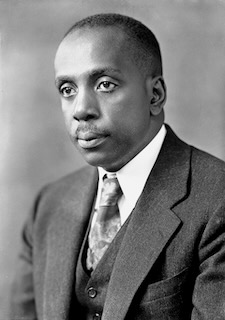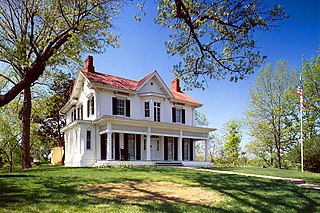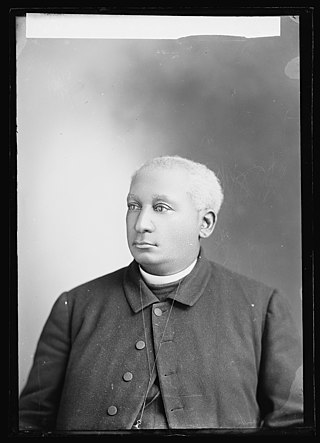
The Anacostia Community Museum is a community museum in the Anacostia neighborhood of Washington, D.C., in the United States. It is one of twenty museums under the umbrella of the Smithsonian Institution and was the first federally funded community museum in the United States. The museum, founded in 1967, was created with the intention to bring aspects of the Smithsonian museums, located on the National Mall, to the Anacostia neighborhood, with the hope that community members from the neighborhood would visit the main Smithsonian museums. It became federally funded in 1970 and focuses on the community in and around Anacostia in its exhibitions. This museum also houses a library.

Anacostia is a historic neighborhood in Southeast Washington, D.C. Its downtown is located at the intersection of Good Hope Road and Martin Luther King Jr. Avenue. It is located east of the Anacostia River, after which the neighborhood is named.

Brookland, also known as Little Rome, is a neighborhood located in the Northeast (NE) quadrant of Washington, D.C. It is best known for its numerous Catholic institutions, including schools, religious communities, shrines, institutes, and other organizations built and based around the Catholic University of America.

Constance Baker Motley was an American jurist and politician, who served as a Judge of the United States District Court for the Southern District of New York. A key strategist of the civil rights movement, she was state senator, and Borough President of Manhattan in New York City before becoming a United States federal judge. She obtained a role with the NAACP Legal Defense and Educational Fund as a staff attorney in 1946 after receiving her law degree, and continued her work with the organization for more than twenty years. She was the first Black woman to argue at the Supreme Court and argued 10 landmark civil rights cases, winning nine. She was a law clerk to Thurgood Marshall, aiding him in the case Brown v. Board of Education. Motley was also the first African-American woman appointed to the federal judiciary, serving as a United States district judge of the United States District Court for the Southern District of New York.

Howard Washington Thurman was an American author, philosopher, theologian, mystic, educator, and civil rights leader. As a prominent religious figure, he played a leading role in many social justice movements and organizations of the twentieth century. Thurman's theology of radical nonviolence influenced and shaped a generation of civil rights activists, and he was a key mentor to leaders within the civil rights movement, including Martin Luther King Jr.

The Frederick Douglass National Historic Site, administered by the National Park Service, is located at 1411 W Street, SE, in Anacostia, a neighborhood east of the Anacostia River in Southeast Washington, D.C. United States. Established in 1988 as a National Historic Site, the site preserves the home and estate of Frederick Douglass, one of the most prominent African Americans of the 19th century. Douglass lived in this house, which he named Cedar Hill, from 1877–1878 until his death in 1895. Perched on a hilltop, the site offers a sweeping view of the U.S. Capitol and the Washington, D.C., skyline.

Benjamin William Arnett was an American educator, minister, bishop and member of the Ohio House of Representatives.
Frank W. Ballou Senior High School is a public school located in Washington, D.C., United States. Ballou is a part of the District of Columbia Public Schools. The principal is Dr. Willie Jackson.

Anna Julia Haywood Cooper was an American author, educator, sociologist, speaker, Black liberation activist, and one of the most prominent African-American scholars in United States history.
Peter John Gomes was an American preacher and theologian, the Plummer Professor of Christian Morals at Harvard Divinity School and Pusey Minister at Harvard's Memorial Church — in the words of Harvard's president "one of the great preachers of our generation, and a living symbol of courage and conviction."

Kingman Park is a residential neighborhood in the Northeast quadrant of Washington, D.C., the capital city of the United States. Kingman Park's boundaries are 15th Street NE to the west; C Street SE to the south; Benning Road to the north; and Anacostia Park to the east. The neighborhood is composed primarily of two-story brick rowhouses. Kingman Park is named after Brigadier General Dan Christie Kingman, the former head of the United States Army Corps of Engineers.

Barry Farm is a neighborhood in Southeast Washington, D.C., located east of the Anacostia River and bounded by the Southeast Freeway to the northwest, Suitland Parkway to the northeast and east, and St. Elizabeths Hospital to the south. The neighborhood was renowned as a significant post-Civil-War settlement of free Blacks and freed slaves established by the Freedmen's Bureau. The streets were named to commemorate the Union generals, Radical Republicans, and Freedmen's Bureau officials who advanced the rights of Black Americans during the Civil War and Reconstruction: Howard Road SE for General Oliver O. Howard; Sumner Road SE for Massachusetts Senator Charles Sumner; Wade Road SE for Ohio Senator Benjamin Wade; Pomeroy Road SE for Kansas Senator Samuel C. Pomeroy; Stevens Road SE for Pennsylvania Congressman Thaddeus Stevens, and Nichols Road for Danforth P Nichols. The neighborhood name is not a reference to the late former mayor of Washington, D.C., Marion Barry, but coincidentally has the same spelling.

Joel Elias Spingarn High School was a public high school located in the District of Columbia, USA. The school is named after Joel Elias Spingarn (1875–1939) an American educator and literary critic who established the Spingarn Medal in 1913, awarded annually for outstanding achievement by an African American.

Fairlawn is a working class and middle class residential neighborhood in southeast Washington, D.C., United States. It is bounded by Interstate 295, Pennsylvania Avenue SE, Minnesota Avenue SE, Naylor Road SE, and Good Hope Road SE.

Good Hope is a residential neighborhood in southeast Washington, D.C., near Anacostia. The neighborhood is generally middle class and is dominated by single-family detached and semi-detached homes. The year-round Fort Dupont Ice Arena skating rink and the Smithsonian Institution's Anacostia Museum are nearby. Good Hope is bounded by Fort Stanton Park to the north, Alabama Avenue SE to the south, Naylor Road SE to the west, and Branch Avenue SE to the east. The proposed Skyland Shopping Center redevelopment project is within the boundaries of the neighborhood.

The Anacostia Historic District is a historic district in the city of Washington, D.C., comprising approximately 20 squares and about 550 buildings built between 1854 and 1930. The Anacostia Historic District was added to the National Register of Historic Places in 1978. "The architectural character of the Anacostia area is unique in Washington. Nowhere else in the District of Columbia does there exist such a collection of late-19th and early-20th century small-scale frame and brick working-class housing."

John Robert Edward Kinard was an American social activist, pastor, and museum director. He is best known as the director of the Anacostia Museum, a small community museum founded by the Smithsonian Institution in 1967. Kinard was the museum's first director, and remained in the post until his death. The Washington Post said Kinard was "a passionate believer in the idea that the well-being of black people depends on having a record of their past". Noted British archeologist and museologist Sir Kenneth Hudson said Kinard "developed the Anacostia Museum into one of the small number of museums of influence in the world."

Louise Daniel Hutchinson was an American historian. She was the former Director of the Research at the Anacostia Community Museum. Growing up in Washington, D.C., Hutchinson was exposed to the Civil Rights Movement and the importance of community. Hutchinson worked closely with the African American community of Washington, D.C. and staff at the Smithsonian Institution to help build the Anacostia Community Museum. She was a historian of the Anacostia community.

The Nineteenth Street Baptist Church, located on 16th Street, NW, is considered to be the first and oldest black Baptist congregation in Washington, D.C. Since its founding in 1839, the church has figured prominently within the historical and social fabric of Washington, D.C.'s African American community.
















